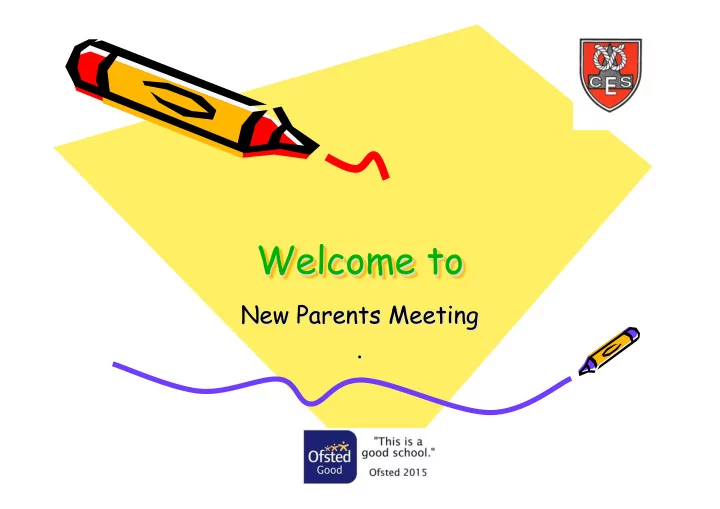

Welcome to New Parents Meeting .
What is the Early Years Foundation Stage? The Early Years Foundation Stage (E.Y.F.S.) is the stage of education for children from birth to the end of the Reception year. It is based on the recognition that children learn best through play and active learning.
The E.Y.F.S. has 4 themes. These are: 1 A Unique Child 2 Positive Relationships 3 Enabling Environments 4 Learning and Development
Within the theme of Learning and Development there are 7 areas of learning. All areas are connected to one another and are equally important. They have been split into 3 Prime areas and 4 Specific Areas. The 3 Prime areas are: 1. Personal, Social and Emotional Development-Self confidence and self awareness, Managing feelings and behaviour and Making relationships. 2. Communication and Language- Listening and attention- Understanding and speaking. 3. Physical Development- Moving and Handling- Control and co-ordination and Health and self care.
Specific Areas The 4 Specific areas are: 1. Literacy- Reading, writing and phonics. 2. Mathematics-Number and Shape and Space. 3. Understanding the World- Geography, History, ICT and Science. 4. Expressive Arts and Design – Art, Dance, Role play, Music and Design Technology.
Letters and Sounds We use letters and sounds to introduce and teach letter sounds or phonics. They provide a thorough foundation for reading and writing. They teach the letter sounds in an enjoyable, multisensory way, and enables children to use them to read and write words. There are 5 basic skills for reading and writing. 1. Learning the letter sounds 2. Learning letter formation 3. Blending sounds together to make words. 4. Identifying sounds in words 5. Spelling the tricky words • We combine Letters and sounds with Read Write Ink. The children learn letter sounds using the letter rhymes and Fred fingers.
Routines • Children will come into school with parents or carers at first. • At the end of the session parents wait by the doors and we will bring your children out to you. • This may change as the children settle and the year progresses. • Everyday your child will take home a reading book, reading diary and Red words (common high frequency words that cannot be sounded out e.g. was). • Please ensure your child brings their book bag every day. Books will be changed each time your child has read.
A Day in Class 1 • 8.45 Children are brought into school and write their name to register. • 9.00- Registration. • 9.05-9.30 Phonics. • 9.30-10.30 Adult directed groups and child initiated activities (English). • 10.30 – 10.45 Assembly- PSHE- Circle time. • 10.45 – 11.00 Playtime. • 11.00 – 11.50 Adult directed and child initiated activities. (Mathematics) • 12.00 – 1.00 Lunch • 1.05-1.20 Everyone Reading in Class • 1.20 – 2.00 Adult directed groups and child initiated activities- (Science, LAC and Humanities). • 2.00 – 2.10 Playtime • 2.10-2.50 Adult directed groups and child initiated activities • 2.50- 3.00 Tidy up • 3.00-3.20 Assembly- PSHE- Story.
Rewards and Sanctions • Dojos • Stickers • Team points • Head teacher award • Worker of the week
Monitoring Progress Each of the areas of learning has its own set of ages and stages working towards the Early Learning Goals’ which determine what most children are expected to achieve by the end of Reception Class. Children in Pre-reception are assessed on a daily basis by observations, their work, and things they say during the activities they are completing or the things they are investigating. We record this information in your child’s learning journey and use it to inform our planning for each individual child’s next steps. Thank you for listening. Any questions please?
Recommend
More recommend